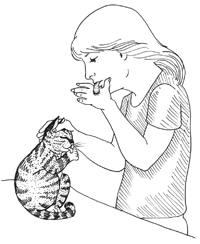STRANGE BUT TRUE- Pro-life: Why dying people won't let go

DRAWING BY DEBORAH DERR McCLINTOCK
Q. What's the most blessed gift any of us can receive, as do thousands of folks for their birthday every year? –Methuselah
A. Extra days of life on planet Earth, say Mitsuru Shimizu and Brett Pelham in Basic and Applied Social Psychology.
When they studied details surrounding 30 million deaths over the years, they found that people were less likely to die right before their birthday or before Thanksgiving or Christmas or New Year's Day than on days just after the events, presumably due to some sort of "death-deferral effect."
Many people seem able to muster the "will to live" a little longer in order to reach these milestones or strong family-connected days. Regarding the milestone effect, the authors explain, people are actually a little more likely to die on the day of their birthday or on New Year's Day, as if attaining these targeted goals triggers a "letting go" process, as happened around the world at the start of the New Millennium. The Christmas and birthday phenomena are especially strong for ailing children, who obviously feel the coming of these special days to the deepest degree.
Q. Every year, a 4-H Camp Whitewood had a Backward Day. When a counselor returned and announced that he would start the bonfire that night with water, catcalls ensued. He volunteered to drink some and did this to wild applause, then poured some on the bottom of the woodpile and walked away. To the crowd's astonishment, the fire ignited. Everyone said it had to be magic. How else could he do that? –D. Slezak
A. His trick was to pre-build the bonfire with potassium permanganate at the bottom, under the paper and kindling. He was actually drinking plain old glycerine, which reacted to start the fire. (Glycerine in sufficient quantity is a laxative.) Worse than catcalls ensued when he later admitted the hoax.
Q. What harm can a zoo do to an elephant? –Tarzan
A. In the worst of cases, do it in prematurely, which may be more common than most of us like to think, says Scientific American magazine.
Zoo elephants have much shorter lives than their wild counterparts, according to a study of 4,500 elephants in European zoos and wildlife refuges: Median life span for African elephants in zoos is about 17 years, in the wild, 56; for Asian elephants, it's 19 versus 42.
Infant mortality runs higher in captives as well, especially among Asian pachyderms, suggesting that something during gestation or early infancy raises the risk for the zoo-born. If there's a hope here, it's that the latest zoo practices seem more animal-friendly, which may yet be reflected in the statistics down the road.
Q. What's the deeper meaning to people "licking their wounds"? Or is this just ancient metaphor drawn from the animal kingdom? –L. Stuart
A. It's more than metaphor. Many animals treat simple injuries by licking them, and, interestingly, studies show that even if another animal of the same species is allowed to lick the wound, healing is facilitated, according to Robert Henkin of the Center for Molecular Nutrition and Sensory Disorders, in Washington D.C.
Studies by Dutch researchers also found that compounds in human saliva called "histatins" not only ward off infections but also prompt cells from the skin's surface to close over a wound, says Karen Wright in Discover magazine.
Saliva's healing powers have long been suspected, since lesions in the mouth mend more quickly and scar less than those on the skin. Though previously ascribed to concentrations of complex "growth factors," these were found to be too low to be effective.
However, when researchers isolated the histatins, wounds closed up twice as quickly as normal. "This finding is good news for clinical medicine," says Wright, "because histatins are cheap to make and more easily purified than growth factors."
~
Send Strange questions to brothers Bill and Rich at [email protected].
#